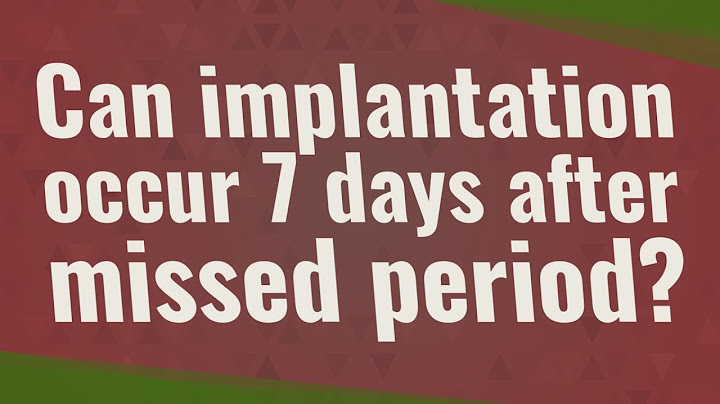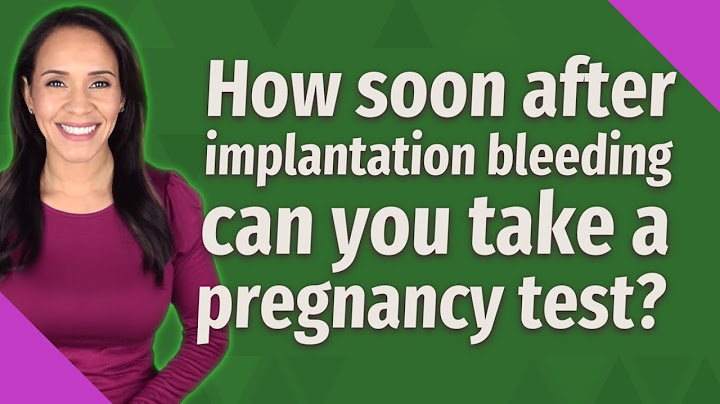When you're trying to get pregnant, your senses are on high alert for any indication that you're officially a parent-to-be. One of the earliest pregnancy symptoms can be implantation bleeding, which happens when the fertilized egg implants into the lining of the uterus. About one-third of pregnant people will experience implantation bleeding, according to the American Pregnancy Association, and it often resembles a light period. Here's everything you need to know. Show
When Does Implantation Bleeding Occur?Only about one-third of people experience implantation bleeding in early pregnancy. If it happens to you, it will occur 10 to 14 days after fertilization, says Lauren Barlog, M.D., assistant professor in the Department of Obstetrics, Gynecology and Women's Health at Rutgers NJ Medical School. "It typically occurs around the time of your next expected period." In fact, because of the timing, some people might confuse implantation bleeding for a light menstrual period. They don't realize what it is until a pregnancy test comes up positive, says Zev Williams, M.D., Ph.D., chief of the Division of Reproductive Endocrinology and Infertility at Columbia University Medical Center. What Does Implantation Bleeding Look Like?Implantation bleeding will probably look different than your normal monthly period. The color usually ranges from light pink to dark brown (period blood is typically red), and it doesn't contain any clots. Also, implantation bleeding is usually lighter than a menstrual period. Some people don't even notice it at all—or they see a small amount of blood when they wipe. In some cases, implantation cramping can occur along with the bleeding. How Long Does Implantation Bleeding Last?Typically, implantation bleeding appears for a day or two (though some people only bleed for a couple of hours). Rather than consistent blood flow, it might be off-and-on. How Soon After Implantation Bleeding Will You Get a Positive Pregnancy Test?If you think you're experiencing implantation bleeding, what's the best course of action? Take a pregnancy test, says Dr. Barlog. Every test has a different threshold for sensitivity, but the absolute earliest you should take one is about four or five days before your expected period, says Dr. Williams. Otherwise there might not be enough pregnancy hormone (hCG) to give a positive result. If the pregnancy test is negative, repeat it in a few days. When Should I Visit the Doctor?Implantation bleeding isn't cause for concern, but if you're experiencing unusual spotting, it's important to recognize when symptoms might require a visit to the doctor. "If you are spotting but also have pain that's concentrated on one side, rectal pain, or a history of infertility or tubal disease, you should see a doctor immediately," says James Segars, Jr., M.D., director of Reproductive Science and Women's Health Research, and a professor of gynecology and obstetrics at Johns Hopkins Medicine. "These are signs that you could have a tubal or ectopic pregnancy, when the fertilized egg implants somewhere other than the uterus, usually within the fallopian tubes." And you also should see your doctor if you've had bleeding or spotting between periods for several months, because you may be dealing with other conditions such as fibroids or polyps. When a fertilized egg attaches to the wall of the uterus, where it can begin growing, some light spotting may occur. This is called implantation bleeding, and it can be one of the earliest clues that you are pregnant. Some women don’t experience this type of bleeding, and some simply don’t notice it. If it happens, it doesn’t indicate a problem with your pregnancy. If you’re wondering if you might be pregnant, take our Am I Pregnant? quiz for a little fun and grab a home pregnancy test. Is It Implantation Bleeding or My Period?It’s possible to mistake implantation bleeding for a very light and early period at first. However, there are some differences to pay attention to. Although every woman’s period is different, it’s still possible to guess that it's implantation bleeding by the color and amount of bleeding, and by where you are in your menstrual cycle, as well as by looking out for other early signs of pregnancy — more frequent bathroom trips, fatigue, and nausea (i.e., morning sickness). These are the main signs and symptoms of implantation bleeding compared to a period:
When Does Implantation Bleeding Happen?You may notice implantation bleeding around 10 to 14 days after conception, when a fertilized egg becomes attached to the lining of your uterus. Keep in mind that conception may not occur on the same day you had sex. Sperm can live as long as five days inside a woman’s reproductive tract, and conception might not occur for several days after sex. Should I Take a Pregnancy Test During Implantation Bleeding?You can take a home pregnancy test during implantation bleeding. Keep in mind that the pregnancy hormone human chorionic gonadotropin (or hCG) that pregnancy tests detect only starts being produced in your body the moment the fertilized egg is implanted in the uterus — which is the trigger for implantation bleeding. The earlier you take the test, the less hCG there is to detect, meaning that the test may not yet be accurate. If you have the patience to wait, you’ll get a more accurate test result if you wait until after the first day of your missed period. If you get a positive test result, schedule an appointment with your healthcare provider to confirm your pregnancy. And you can get an estimate of when to expect your baby by using our handy tool to calculate your due date. Should I See a Doctor?Implantation bleeding is generally nothing to be concerned about, but it’s a good idea to talk to your healthcare provider about any bleeding you experience during pregnancy. Although light bleeding in early pregnancy can be totally normal, there are some reasons for bleeding in early pregnancy that need to be addressed immediately. These can include infection, miscarriage, or ectopic pregnancy. How many weeks are you pregnant at implantation?How many weeks are you at implantation? Implantation occurs soon, at about 4 weeks pregnant. For implantation to happen, the cells in the fertilized egg, now a morula, will continue to divide until it becomes a blastocyst.
Am I pregnant or is it implantation bleeding?The best way to know whether you're pregnant or not is to wait a few more days and take a pregnancy test. The timing of when you last had sex might also help you figure it out. If it's been more than two weeks, it's unlikely that any spotting you're having is implantation bleeding.
|

Related Posts
Advertising
LATEST NEWS
Advertising
Populer
Advertising
About

Copyright © 2024 chuyencu Inc.


















